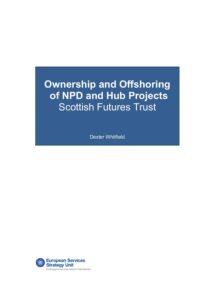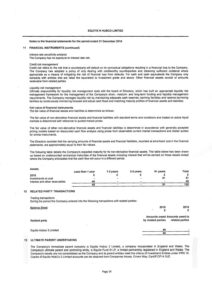The research was commissioned by The Guardian and by The Ferret investigative journalism platform, both of which published articles on the findings and analysis.
Extract from the summary of the ESSU report by Dexter Whitfield:
Scottish Futures Trust ‘Non-Profit Distributing’ (NPD) and Hub projects have significant structural corporate relationships with offshore tax havens. They account for 29.4% of private sector NPD and hub shareholding (excluding SFT, other public sector participants and projects with hub Community Foundation shareholdings). Although the 47 SPVs and the bulk of the development companies are registered in Scotland, they are primarily owned by companies such as Equitix, Balfour Beatty, Interserve, Galliford Try, Amber Infrastructure and Morgan Sindall, all registered in England and Wales.
Connection between Scottish public sector pension fund investments, offshore tax haven links and shares in NPD and hub companies
Four Scottish pension funds have investments in offshore infrastructure funds with stakes in NPD and hub projects. Glasgow City Council, on behalf of Strathclyde Pension Fund, has a £30m investment in the Equitix Fund IV LP since 2016; Edinburgh City Council, on behalf of Lothian Pension Fund and Lothian Buses Pension Fund and the Falkirk Council Pension Fund have investments in the Equitix Fund II LP. Both Equitix funds are ultimately owned by Tetragon Financial Group Limited, which is registered offshore in Guernsey.
The Strathclyde Pension Fund agreed in late May 2018 to invest £50m in the Equitix Fund V LP, managed by Equitix GP 5 Limited (Guernsey) having invested £30m in 2016.
It is vital that public sector bodies and pension funds understand the conflicts of interest and consequences of investments in infrastructure funds ultimately managed and controlled offshore. It leads to the loss of UK tax revenue, a risk of action against offshore jurisdictions and decisions made on investment grounds that frequently have a negative impact on jobs, the local economy and the quality of public infrastructure. Decisions are often influenced by investment advisers with narrow interests seeking to maximise fees and fail to take account of the loss of accountability and transparency.
Strathclyde Pension Fund makes its largest ever infrastructure investment
The May 2018 meeting of the pension fund agreed to invest a staggering £500m in the JPMorgan International Infrastructure Fund. The $14.5bn JPMorgan fund invests in three sectors – transportation, regulated utilities and contracted power – primarily in the US (37%), Europe (24%) and UK (21%) (JPMorgan Asset Management, 2017). This part of Strathclyde’s strategy to increase infrastructure investment overseas (Infrastructure Investor, 2018a).
Ownership matters
Over 51% of the equity in UK PFI projects is owned by infrastructure funds located in offshore tax havens. The five largest listed offshore infrastructure funds made a total profit of £2.9bn in the five-year period 2011-2017, but paid no corporate tax in this period. Offshoring also decreases transparency and democratic accountability.
ACP: Hub North Limited is a joint venture between Currie & Brown Equitix Ltd and Galliford Try Investments Ltd, registered in England and Wales. However, Currie & Brown Equitix Ltd is also a joint venture owned by Equitix companies with ultimate ownership by the Tetragon Financial Group Ltd in Guernsey via the Cayman Islands.
Currie & Brown Ltd is ultimately owned by Dar Al-Handasah Consultants Shair and Partners Holdings Limited in the Dubai International Financial Centre (a financial zone with its own regulatory and tax regime) via Jersey. Dar Al-Handasah are international engineering consultants which are part of the Dar Group of architectural, civil and structural engineering, financial and construction consultancies with 200 offices in the US, Europe, Middle East, Africa and Asia.



